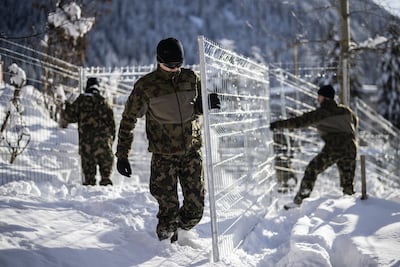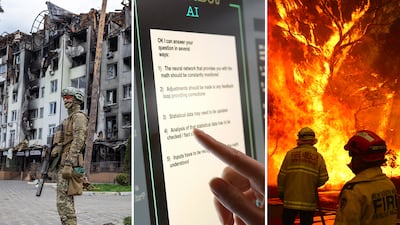The world faces a gloomy outlook for the next two years amid colliding threats from technology, extreme weather and conflict – and things will only get worse after that, say risk assessors advising the globe's elite.
Experts say progress in human development is being “chipped away”, leaving people vulnerable to “new and resurgent risks” that many fear will end in global catastrophe in the next decade.
A risk report published before the World Economic Forum in Davos, which begins next week, says disinformation – potentially fuelled by AI – is the biggest immediate danger as billions of voters go to the polls in 2024.
Extreme weather and polarised societies are also in the top three risks facing the world in the next two years, according to the report, which draws on the views of insurers and more than 1,400 experts and policymakers.
Looking over a 10-year span, environmental threats – including extreme weather, climate change, ecosystem collapse and resource shortages – make up the top four predicted risks.
Adverse effects of AI are only seen as the 29th-biggest threat for the next two years, but rise to sixth in the 10-year assessment, with cyber insecurity also seen as a stark danger.
Among the report's downbeat predictions:
· Environmental risks could "hit the point of no return", leaving societies unable to meet the huge cost of adaptation
· Truth will come under pressure as misinformation affects elections, divides societies and paves the way for censorship
· Economic strains are set to grow, with vulnerable countries potentially left further behind by being isolated from AI breakthroughs
· The mixture of AI and armed conflict could be highly dangerous, with militant groups possibly gaining access to new kinds of malware and biological weapons
· A deeper divide between the global north and south could "paralyse international governance mechanisms" and stop these risks being tackled

World leaders heading to Davos are challenged to “lay the groundwork for a more resilient, sustainable, inclusive future” as well as fighting short-term crisis points, said Saadia Zahidi, managing director of the World Economic Forum.
“An unstable global order characterised by polarising narratives and insecurity, the worsening impacts of extreme weather and economic uncertainty are causing accelerating risks – including misinformation and disinformation – to propagate,” she said.
Chances of catastrophe
The analysts gave a “predominantly negative outlook” for the next two years, the report says, which only becomes “markedly more negative” over the 10-year span.
Within two years, 30 per cent of experts expect upheavals and a “stormy or turbulent” global picture in which the risk of a global catastrophe is “elevated” – or worse.
Some 63 per cent give the same gloomy verdict on the next decade. The other 37 per cent take a more optimistic view, believing there will be isolated disruptions with the risk of catastrophe low to negligible.
Misinformation and disinformation are predicted to worsen social divides in the next two years, potentially leading to post-election unrest, violent protests, hate crimes and terrorism.

The experts warn that “perceptions of reality are likely to also become more polarised”, opening the door for governments to control information based on what they regard to be true.
The task of tackling disinformation will be “radically disrupted” by AI breakthroughs, said Carolina Klint, the chief commercial officer for Europe at the financial services company Marsh & McLennan.
“At the same time, companies are having to negotiate supply chains made more complex by geopolitics and climate change and cyber threats from a growing number of malicious actors,” she said.
Tech meets conflict
Technology could also be thrown dangerously into the mix of armed conflicts, the experts warn, giving states and militants a “superhuman breadth of knowledge” thanks to AI.
“The creep of machine intelligence into conflict decision-making – to autonomously select targets and determine objectives – would significantly raise the risk of accidental or intentional escalation over the next decade,” they say.
Meanwhile, AI-enabled crime, militancy and radicalisation could be worsened by economic hardship and resource stress, underscoring the links between the different risks facing the world.
Climate risks are expected to come to a head in what is often described as a critical decade for action if the world is to limit global warming to 1.5°C above pre-modern times. An overshoot could “overwhelm” the world’s ability to adapt.
However, views differ among age groups and sectors, with younger people more likely to see the threat as immediate than private businesses – suggesting “sub-optimal alignment and decision-making”, the report says.


